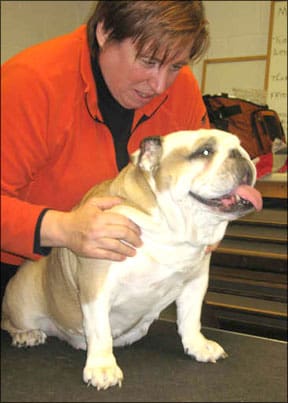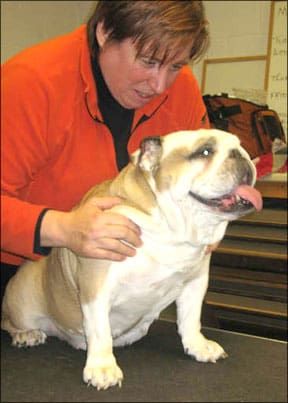- In the February 2008 article on dry dog foods, we incorrectly reported the manufacturer of Burns Pet Health’s dry foods. These products are manufactured by CJ Foods in Kansas.
- Due to an editing error, in the March 2008 article on grain-free dog foods, we incorrectly reported the ash content of Taplow Feeds’ FirstMate Potato and Chicken with Blueberries food. The correct ash content is 7 percent.
We apologize for any inconvenience we have caused through these errors.
Regarding the article about canine anorexia (“Tales of the Lost Appetite,” March 2008): As an RN and 50-plus-year dog owner, I appreciated it very much. However I did notice a mention of one cause of anorexia that almost took the life of my Boston Terrier: grief.
I had two dogs at the time, the other being a 10-year-old Pug who suddenly became critically ill with a lethal brain tumor. We had gotten both dogs at the ages of eight weeks and they were very, very close. When the Pug did not come home from the veterinarian and her crate was put away, the Boston totally stopped eating and became very lethargic (she had always inhaled her food and was extremely active prior to this.) We were frightened that we were going to lose her too, and made numerous calls and visits to our vet to investigate.
To make a long, terrifying story short, we never found a physical cause for her inappetence; it was grief. I spent several weeks tempting her with various treats, human food, and finally baby food mixed with her dog food. I also took her to a local pet supply store for a change of scene. She picked out – on her own – a small latex ball slightly larger than a golf ball, proudly carried it out to the car by herself, and it became forever known as “Happy Ball.” That was what started her back on the road to health! Well, that and much loving care and snuggling from her human family.
It did take several months to get her totally back to “normal.” She lived many years after this but always had to have “Happy Ball” out to play with daily.
Just as we humans can suffer grief after the loss of a loved one, so can our canine buddies.
Barb Roehl
Green Bay, WIWhen I got my subscription today, I couldn’t WAIT to read “Tales of the Lost Appetite.” You see, I’m owned by a German Shepherd Dog with Exocrine Pancreatic Insufficiency (EPI), who wouldn’t eat, but does now.
My girl’s saga started when she was diagnosed with EPI about the same time we had to put down our other dog, a 14-year-old. Our girl completely stopped eating for weeks and barely ate for about a year. Her always-lean body went into an emaciated state for that year. I didn’t know whether it was the pancreatic enzymes we needed to add to her food for her survival, or whether it was that she missed a valued member of her pack. I tried everything mentioned in the article, but nothing worked. It was the most stressful year of my life.
We ended up adopting another German Shepherd Dog from a shelter and I think the woman must have thought I was nuts when I was mostly concerned with how this dog ate. Was she enthusiastic about food? Did she eat everything on her plate?
Providing another canine companion is what ultimately worked for us. My formerly anorexic girl is now a good healthy weight, although we need to take a few pounds off the rescue who really, really loves food – and who cannot believe we actually cook food for dogs!

288
I’m glad this topic was addressed in Whole Dog Journal as most folks laughed at me when I told them my dog wouldn’t eat. They said she was just picky. I had actually put a filet of beef in her dish and she walked away from it. Thankfully, we don’t have that problem anymore! Please, let it stay that way!
Donna
via e-mailJust to add to the credits of Sue Ann Lesser, DVM, who was mentioned in “Chiropractors for Canines,” March 2008. My dog Baby was experiencing seizures on a regular basis beginning in April 2002. We tried acupuncture for a long time, until someone told me about Dr. Lesser. Baby had a seizure three days after her first adjustment – but that was Baby’s last seizure.
Baby now sees Dr. Lesser monthly. As far as I am concerned, chiropractic and Dr. Lesser saved my dog’s life. She is located in South Huntington, New York, and can be reached at (631) 423-9223 or AR18AR180@msn.com.
Yankee Gindoff
via e-mail





